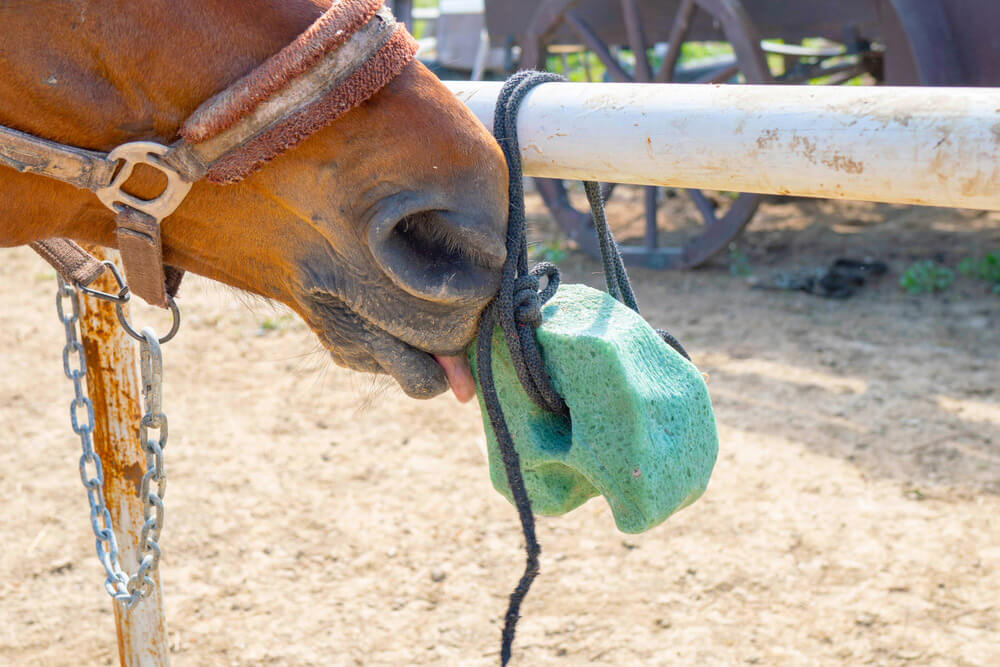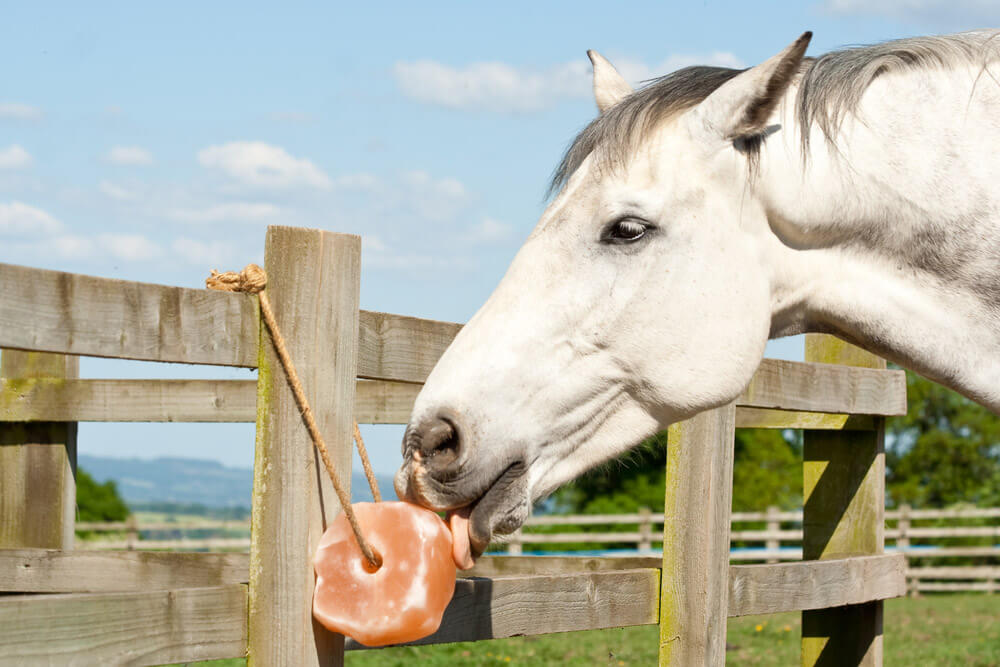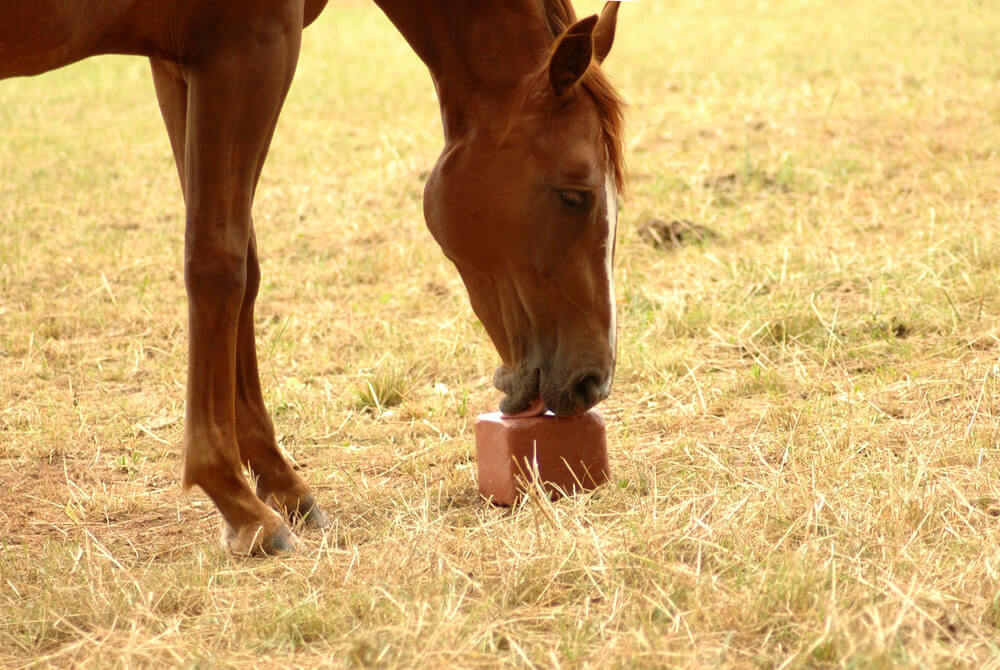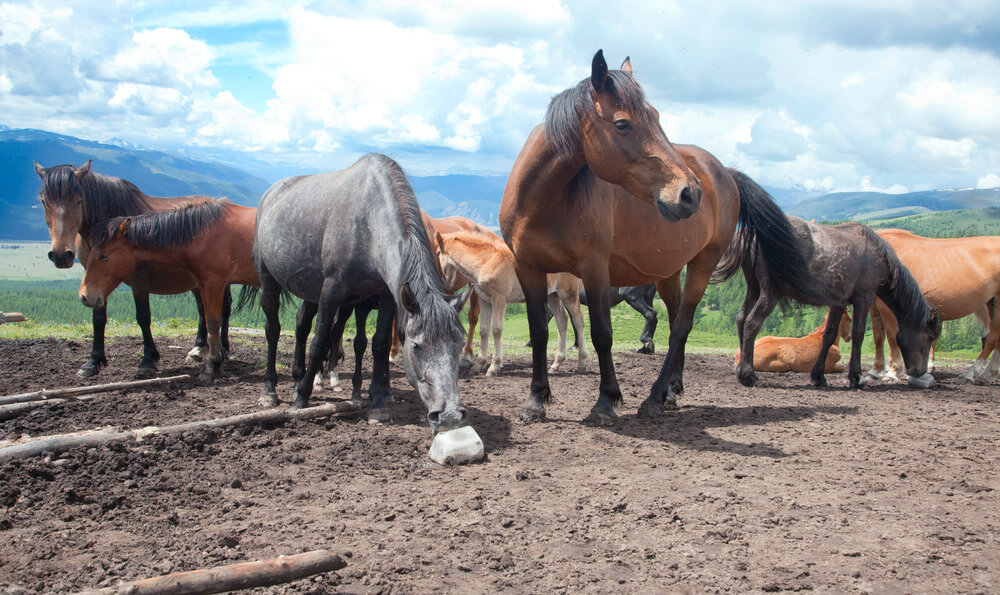Apart from proper feeding and watering, your horse needs a solid portion of minerals. In summer, when it’s getting hotter, horses tend to sweat a lot. And with sweating, they lose a decent amount of minerals that is vital for their state of health. Thus, horse owners get a horse salt lick to maintain the level of electrolyte.
Let’s dip in nuts and bolts of supplementing salt in the horse’s nutrition.

Do Horses Need Salt?
Yes, they do, and here’s why. Salt is an essential mineral that isn’t produced by the body, thus, we need to add it to our horse’s diet. Horses innately crave salt when they’re feeling starved. They usually regulate the amount of salt consumed on their own.
Salt contains essential elements such as sodium and chloride. Horses need sodium to encourage muscle contraction and nerve impulses conduction. Besides, sodium helps to digest protein properly. Chloride is helpful in order to blood pH control and fluid regulation. It also plays a high role in digestion.
Lots of variations are available nowadays, from “Rock Salt on Rope” to “Horse Mineral Block”. Both mineral blocks and salt blocks for horses are worth consideration. Keep reading to find out why.

How Much Salt Should I Feed My Horse?
Researches show that an average horse (1,100 pounds) needs 10 grams of sodium and 40 grams of chloride on a daily basis. You may need 28-56 grams of table salt daily. That works on the condition that your horse doesn’t work much. Speaking of sport horses like dressage horses, the amount of minerals rises up to 17.8 grams and 53.3 grams respectively.
When the summertime is coming, increase the amount of salt up to 110-170 grams. Additionally, if you feed your horse with grain and supplements, pay attention to its salt content. A solid part of the minerals needed you can get from them. Horses can control the consumption of salt but it’s better to check whether they get proper nutrition.
Sodium in Horse Feeding
A few more important words about sodium. It’s a vital electrolyte that helps to regulate the horse’s hydration process. It helps to balance fluid in the body, thus it affects the horse’s water consumption. In the case of sodium deficit, the horse may refuse to drink enough water in case of not “wasting” fluid. Hence, the proper salt supplement has a great impact on horse watering and its hydration.
As we already mentioned, the horse gets dehydrated as a result of high performance and sweating. That’s why you should replenish the level of electrolytes right away. Apart from fluid disbalance, the shortage of sodium and chloride also negatively affects the horse’s eating. This may lead to inadequate actions like eating dirt in order to find a new source of nutrients.
There’s a risk of colic caused by the low fluid as well as weight loss. More severe symptoms include muscle weakness, reduced skin turgor, and uncoordinated muscle contractions. Therefore, watch your companion gets proper salt intake to avoid such issues. To do so, you can consider a salt block for horse.

Types of Salt
You may find a wide range of salt licks for horses on the market. Depending on your companion preferences, you’re able to pick between plain salt blocks, sea salt, loose table salt, Himalayan salt, mineral blocks, horse lick on a rope, and many others. The nutrient content is different in these supplements, thus, check their description to meet your hooved friend’s needs.
For instance, table salt and salt block for horses contain sodium chloride only. You can start with this product if you’re unsure what exactly your horse needs. Additionally, there’s iodized table salt that comes with a decent amount of iodine. However, check your horse’s supplements not to overdo with this component.
Trace mineral blocks for horses contain trace minerals like zinc, copper, iron, cobalt, iodine, etc. Such elements are vital for equine’s well-being, immunity, and growth. Besides, they help to manage the level of insulin, bone development, and tissue strengthening.
Horse rock salt is another type of salt your horse may like. Himalayan salt is consumed easier than table salt. Apart from that, you can tie the horse salt lick with a rope and your companion can compensate sodium chloride with grazing at the paddock. There also Himalayan loose salt and block salt available.

How to Serve Salt to a Horse
You can supplement sodium chloride in various ways depending on your horse preferences and other conditions.
First, you could add loose salt to the companion’s food as people add salt to their meal. That’s a good option as you can control the amount of mineral your hooved pal is consuming. When purchasing loose salt, make sure it’s produced for equines and it’s made solely of sodium chloride. Moreover, such type of salt is consumed flawlessly. Provide your horse with proper watering to avoid fluid disbalance.
Alternatively, you can put salt in a bucket and your horse will come to it as soon as it’s starving. This option needs your daily tracking of the amount of salt consumed. If you see the reserve is about to end, refill it right away. Besides, keep the bucket in a safe place out of dirt and insects.
Another way is to tie a salt block to the pole at the stall or pasture. This will make the horse salt lick be off the ground, which is a plus. As with the bucket, your companion can reach the salt block at any time he wants. However, pay attention to the product and check its firmness in advance. Some blocks may be too hard to be licked and the horse may end up biting the block causing dental problems.

Final Thoughts
Long story short, salt is an integral part of healthy horse feeding to foster its digestion. Sodium and chloride as important minerals foster fluid control and muscle contraction. Hence, pay attention to the amount of salt your horse consumes daily. Control the salt intake depending on the workload and weather conditions.
Loads of horse salt licks allow you to choose the ideal option for your horse. This affects your companion’s well-being and performance. Stay healthy and wealthy!
